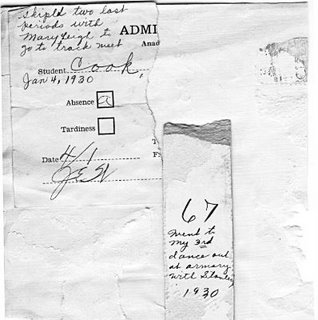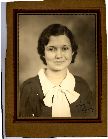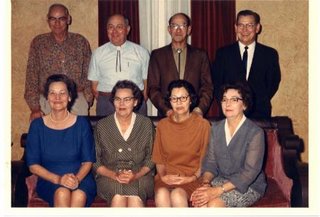A Tribute to Oklahomans
Most of the images of that time focus on the move west - lines of vintage automobiles traveling down highway 66 with bags of water tied to the front and lines of people waiting in soup lines. My parents, both grandmothers and most of my aunts and uncles are among those brave souls who got up every morning and swept the dust from the doorway that came in through the keyhole overnight and who planted honey locust trees along the edges of fields to keep the dirt from blowing away.
 Before the dust bowl, life was fairly normal for my parents. In early January 1930, my mother got permission to skip the last two periods at Anadarko High School to attend the local track meet with Mary Leight Baird, daughter of local pioneers and a lifetime friend of my parents. She also kept the ticket stub from her third "dance out" held at the armory in Anadarko - an event that she attended with my father before they were married and an event held only a half block from the house where they lived when I was born.
Before the dust bowl, life was fairly normal for my parents. In early January 1930, my mother got permission to skip the last two periods at Anadarko High School to attend the local track meet with Mary Leight Baird, daughter of local pioneers and a lifetime friend of my parents. She also kept the ticket stub from her third "dance out" held at the armory in Anadarko - an event that she attended with my father before they were married and an event held only a half block from the house where they lived when I was born. In 1931 when the drought began my parents, William Stanley Hall and Rubey Della Cook (photo at left), were new graduates of Anadarko High School. Both of their fathers (Levi Elmer Hall in 1925 and William Moses Cook in 1916) had died leaving widows and children to cope with an uncertain future. My father was industrious and worked at a variety of jobs after his father died - from selling newspapers to wrapping butter at Whitaker's Creamery. My mother was able to live with her sister, Ruth Naomi Dutcher (nee Cook) in Anadarko during high school and then went to college at the Oklahoma College for Women in Chickasha.
In 1931 when the drought began my parents, William Stanley Hall and Rubey Della Cook (photo at left), were new graduates of Anadarko High School. Both of their fathers (Levi Elmer Hall in 1925 and William Moses Cook in 1916) had died leaving widows and children to cope with an uncertain future. My father was industrious and worked at a variety of jobs after his father died - from selling newspapers to wrapping butter at Whitaker's Creamery. My mother was able to live with her sister, Ruth Naomi Dutcher (nee Cook) in Anadarko during high school and then went to college at the Oklahoma College for Women in Chickasha.It was a time of great change and presented both challenges and opportunities. I was lucky enough to meet a local man late in his life who happened to have some money during the 1930s in Oklahoma. He purchased farms in Caddo and Grady counties that were abandoned by the those migrating west and paid only the amount of back taxes - usually less than $100 for 160 acres of land that later produced a fortune in oil and gas. It’s interesting that some people make money while others are losing everything.

All of the children of Levi Elmer Hall and Mary Mahala Longenecker who were living in 1969
Front: Barbara Alberta Oelke, Ruth Marie Reiss, Clara Belle Hall, Stella Jane Fisher
Back: James Daniel Hall, Lewis Elmer Hall, Carl Edward Hall, William Stanley Hall
My uncle, James Daniel Hall, moved to Oakland and painted ships during the war and my aunt Barbara Alberta Hall married Samuel Joseph Oelke and moved from the oil fields in Oklahoma to the oil fields of California. My Aunt Stella Jane Hall married Paul Fisher and moved to Yreka California. James Daniel eventually moved back to Oklahoma and died there. I remember trips to California to visit our cousins and reunions in Oklahoma when they came to visit us.
On one trip to California (many years after the depression), Aunt Barbara had a particular beach that she wanted us to see and I was anxious to get there. I remember Aunt Barbara pointing straight left and telling my dad to "Turn right" causing a great confusion and providing a good long-term laugh. As it turned out, we drove for a very long time and the sand was so hot that we couldn't stand it. So we returned to Long Beach where the water was only a couple of blocks from Aunt Barbara's house. She had an avocado tree in the front yard that we climbed - the avocados that she picked during the winter and sent to Oklahoma as a special treat at Thanksgiving or Christmas.
During that same trip, we drove north to Uncle Jim's house near Chico. He lived in an almond orchard - pronounced "ammon” orchard by Uncle Jim. He was married at that time and I remember his wife whisking my mother away to measure her for a homemade bra. My brother, Kent, and I went fishing in a creek nearby and got our line tangled in a big bush - our first experience with poison sumac. We only knew about poison oak in Oklahoma and it looked nothing like the California version. By the time we got to Aunt Stella's house in Yreka, we were swollen up all over. We saw a doctor there who gave us some shots that provided some relief.
From there we drove to my Aunt Ruth Hall's house (who married Carl Reiss) near Connell, Washington. They were farmers who moved west long after the dust bowl - and lots of fun. Uncle Carl was a big joker and loved to tease. The last time that we saw him, he told a really long story while we watched the news on television. I got comfortable and took a little snooze as he talked. When I woke up he was still talking and I woke up just in time for the punch line, “Everybody spoke German at home and on the first day of school I couldn’t speak a word of English. Now my pronounce-ation is real good.” He was always good for a laugh. Aunt Ruth was famous for her work in the kitchen. They had a dairy in Oklahoma and when we visited there, she made fresh butter and sand-plum jelly, butchered chickens, and kept a garden. Her hot rolls were cherished and we always buttered and jellied a batch to eat on the way back to Anadarko. One time, Carl J. (junior) replaced our sack of rolls with a sack of walnuts which we didn’t discover until we were well on our way.
All the rest of our family pretty much stayed in the Oklahoma area - 13 children in my father's family and 11 children in my mother's family - so holidays were pretty exciting. It seems like all of these family members never really got over the dust bowl and the depression. They were very cautious with money and hated to be in debt. It was a defining moment in their lives and they never forgot the lessons learned during that time.
So I have always admired the people in Oklahoma. They were hardened by circumstance and those who stayed were very special people who found opportunity and built lives for themselves despite the hard times.

4 Comments:
I am the grand-daughter of Barbara Oelke, Lynne Telford. I too enjoyed the avacado tree in the front of her house.
I found this article because I our library district in Colorado Springs is sponsoring a series of events related to the dust bowl. Our community is reading "The Grapes of Wrath" and "The Worst Hard Time" - both about the dust bowl.
Parts of my family come from Anadarko, so I googled to find this great article.
By Lynne Telford, at 6:03 AM
Lynne Telford, at 6:03 AM
Hi Lynne, Thank you for writing. It is good to hear from you. I probably have some information about your relatives in Anadarko - not so much on the Oelke family. Gene
By Gene Hall, at 6:09 PM
Gene Hall, at 6:09 PM
THank you, Lynne...you will find this and many other cultural artifacts on our library website: ppld.org. Dee Vazquez
By Anonymous, at 2:20 PM
Anonymous, at 2:20 PM
I am really enchanted the way you have depicted the whole stories. One needs lots of character to stay alive in that hard time.
By Jonty, at 3:23 AM
Jonty, at 3:23 AM
Post a Comment
<< Home